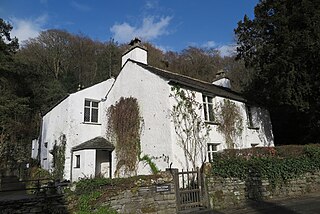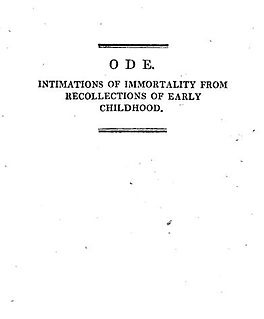Related Research Articles

Samuel Taylor Coleridge was an English poet, literary critic, philosopher and theologian who, with his friend William Wordsworth, was a founder of the Romantic Movement in England and a member of the Lake Poets. He also shared volumes and collaborated with Charles Lamb, Robert Southey, and Charles Lloyd. He wrote the poems The Rime of the Ancient Mariner and Kubla Khan, as well as the major prose work Biographia Literaria. His critical work, especially on William Shakespeare, was highly influential, and he helped introduce German idealist philosophy to English-speaking culture. Coleridge coined many familiar words and phrases, including "suspension of disbelief". He had a major influence on Ralph Waldo Emerson and American transcendentalism.

William Wordsworth was an English Romantic poet who, with Samuel Taylor Coleridge, helped to launch the Romantic Age in English literature with their joint publication Lyrical Ballads (1798).

Hartley Coleridge, possibly David Hartley Coleridge, was an English poet, biographer, essayist, and teacher. He was the eldest son of the poet Samuel Taylor Coleridge. His sister Sara Coleridge was a poet and translator, and his brother Derwent Coleridge was a scholar and author. Hartley was named after the philosopher David Hartley.
The Prelude or, Growth of a Poet's Mind; An Autobiographical Poem is an autobiographical poem in blank verse by the English poet William Wordsworth. Intended as the introduction to the more philosophical poem The Recluse, which Wordsworth never finished, The Prelude is an extremely personal work and reveals many details of Wordsworth's life.

"I Wandered Lonely as a Cloud" is a lyric poem by William Wordsworth. It is one of the most popular poems of Wordsworth. The poem was inspired by an event on 15 April 1802 in which Wordsworth and his sister Dorothy came across a "long belt" of daffodils while wandering in the forest. Written some time between 1804 and 1807, it was first published in 1807 in Poems, in Two Volumes, and a revised version was published in 1815.
The Lake Poets were a group of English poets who all lived in the Lake District of England, United Kingdom, in the first half of the nineteenth century. As a group, they followed no single "school" of thought or literary practice then known. They were named, only to be uniformly disparaged, by the Edinburgh Review. They are considered part of the Romantic Movement.

Dove Cottage is a house on the edge of Grasmere in the Lake District of England. It is best known as the home of the poet William Wordsworth and his sister Dorothy Wordsworth from December 1799 to May 1808, where they spent over eight years of "plain living, but high thinking". During this period, William wrote much of the poetry for which he is remembered today, including his "Ode: Intimations of Immortality", "Ode to Duty", "My Heart Leaps Up" and "I Wandered Lonely as a Cloud", together with parts of his autobiographical epic, The Prelude.
Nationality words link to articles with information on the nation's poetry or literature.
Nationality words link to articles with information on the nation's poetry or literature.

"Ode: Intimations of Immortality from Recollections of Early Childhood" is a poem by William Wordsworth, completed in 1804 and published in Poems, in Two Volumes (1807). The poem was completed in two parts, with the first four stanzas written among a series of poems composed in 1802 about childhood. The first part of the poem was completed on 27 March 1802 and a copy was provided to Wordsworth's friend and fellow poet, Samuel Taylor Coleridge, who responded with his own poem, "Dejection: An Ode", in April. The fourth stanza of the ode ends with a question, and Wordsworth was finally able to answer it with seven additional stanzas completed in early 1804. It was first printed as "Ode" in 1807, and it was not until 1815 that it was edited and reworked to the version that is currently known, "Ode: Intimations of Immortality".

The Lucy poems are a series of five poems composed by the English Romantic poet William Wordsworth (1770–1850) between 1798 and 1801. All but one were first published during 1800 in the second edition of Lyrical Ballads, a collaboration between Wordsworth and Samuel Taylor Coleridge that was both Wordsworth's first major publication and a milestone in the early English Romantic movement. In the series, Wordsworth sought to write unaffected English verse infused with abstract ideals of beauty, nature, love, longing and death.
William Wordsworth was an English Romantic poet who, with Samuel Taylor Coleridge, helped launch the Romantic Age in English literature with their 1798 joint publication, Lyrical Ballads. His early years were dominated by his experience of the countryside around the Lake District and the English moors. Dorothy Wordsworth, his sister, served as his early companion until their mother's death and their separation when he was sent to school.
Lines Written at Shurton Bars was composed by Samuel Taylor Coleridge in 1795. The poem incorporates a reflection on Coleridge's engagement and his understanding of marriage. It also compares nature to an ideal understanding of reality and discusses isolation from others.

The conversation poems are a group of at least eight poems composed by Samuel Taylor Coleridge (1772–1834) between 1795 and 1807. Each details a particular life experience which led to the poet's examination of nature and the role of poetry. They describe virtuous conduct and man's obligation to God, nature and society, and ask as if there is a place for simple appreciation of nature without having to actively dedicate one's life to altruism.
Frost at Midnight is a poem by Samuel Taylor Coleridge, written in February 1798. Part of the conversation poems, the poem discusses Coleridge's childhood experience in a negative manner and emphasizes the need to be raised in the countryside. The poem expresses hope that Coleridge's son, Hartley, would be able to experience a childhood that his father could not and become a true "child of nature". The view of nature within the poem has a strong Christian element in that Coleridge believed that nature represents a physical presence of God's word and that the poem is steeped in Coleridge's understanding of Neoplatonism. Frost at Midnight has been well received by critics, and is seen as the best of the conversation poems.
Fears in Solitude, written in April 1798, is one of the conversation poems by Samuel Taylor Coleridge. The poem was composed while France threatened to invade Great Britain. Although Coleridge was opposed to the British government, the poem sides with the British people in a patriotic defense of their homeland. The poem also emphasizes a desire to protect one's family and to live a simple life in harmony with nature. The critical response to the poem was mixed, with some critics claiming that the work was "alarmist" and anti-British.
"Dejection: An Ode" is a poem written by Samuel Taylor Coleridge in 1802. The poem in its original form was written to Sara Hutchinson, a woman who was not his wife, and discusses his feelings of love for her. The various versions of the poem describe Coleridge's inability to write poetry and living in a state of paralysis, but published editions remove his personal feelings and mention of Hutchinson.
To William Wordsworth is a poem by Samuel Taylor Coleridge written in 1807 as a response to poet William Wordsworth's autobiographical poem The Prelude, called here "that prophetic lay". Wordsworth had recited that poem to his friend Coleridge personally. In his poem, Coleridge praises Wordsworth's understanding of both external and human nature, at the same time emphasizing Wordsworth's poetic achievement and downplaying his own.
"A slumber did my spirit seal" is a poem written by William Wordsworth in 1798 and published in the 1800 edition of Lyrical Ballads. It is usually included as one of his The Lucy poems, although it is the only poem of the series not to mention her name. The poem is a mere eight lines long; two "stanzas."

Romanticism was an artistic, literary, and intellectual movement that originated in Europe toward the end of the 18th century. Scholars regard the publishing of William Wordsworth's and Samuel Coleridge's Lyrical Ballads in 1798 as probably the beginning of the movement, and the crowning of Queen Victoria in 1837 as its end. Romanticism arrived in other parts of the English-speaking world later; in America, it arrived around 1820.
References
- 1 2 Baldick, Chris (2008). The Oxford Dictionary of Literary Terms. Oxford UP. p. 70. ISBN 9780199208272.
- ↑ Robinson, Daniel (2010). William Wordsworth's Poetry. A&C Black. p. 67. ISBN 9781441145871.
- ↑ Barth, J. Robert (2003). Romanticism and Transcendence: Wordsworth, Coleridge, and the Religious Imagination . U of Missouri P. p. 73. ISBN 9780826214539.
- ↑ Gill, Stephen Charles (1991). Wordsworth: The Prelude. Cambridge UP. p. 23. ISBN 9780521369886.